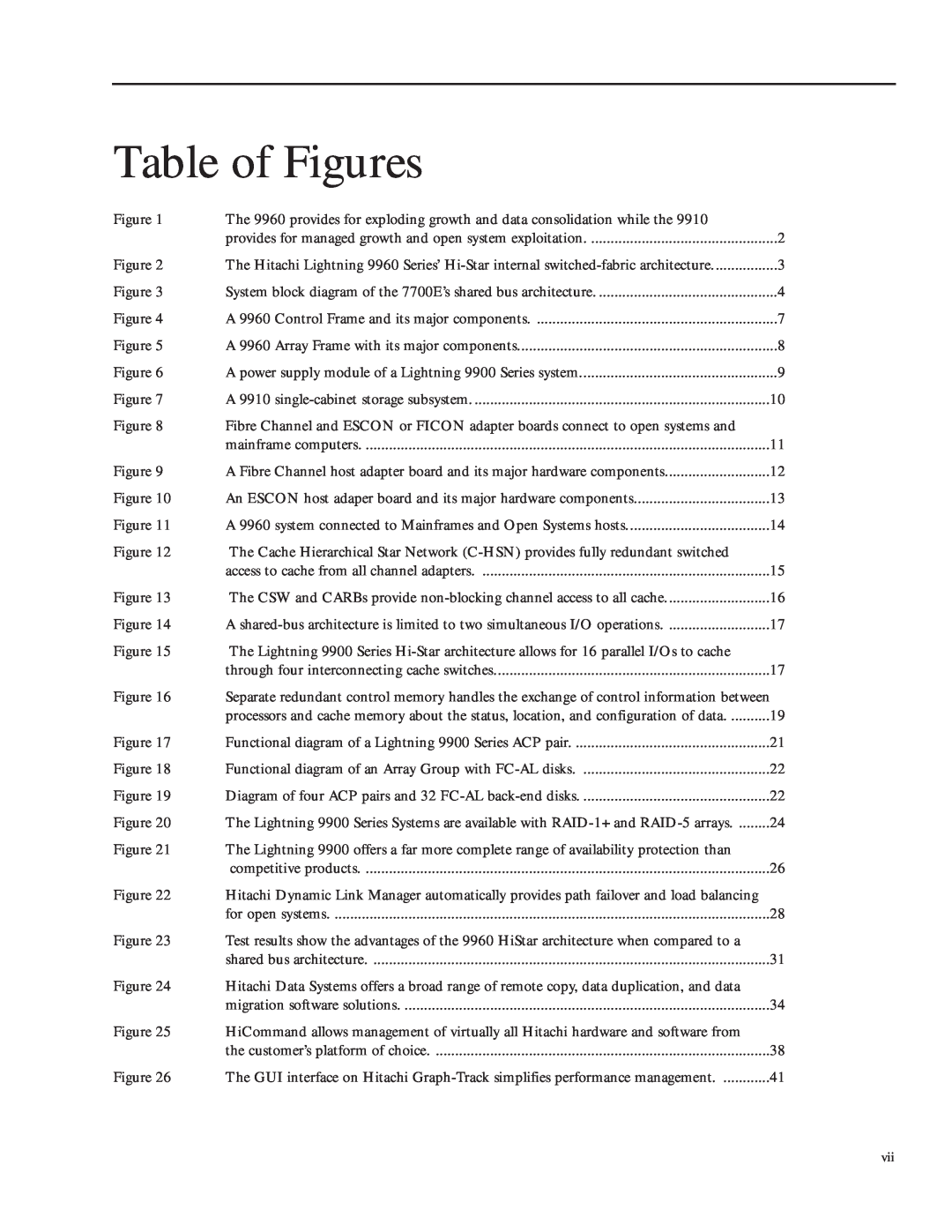Page
Page
Hitachi Data Systems
Table of Contents
Hitachi Data Systems
Read-aheadfor High-performanceSequential Reads
Remote Copy
Hitachi NanoCopy Implementation Service
Hitachi Data Systems
Table of Figures
Tables
Hitachi Data Systems
Lightning 9900 Series Product Offerings
Introduction
The most advanced design in storage
The most powerful storage system in the world
Hitachi Data Systems
Introduction
Hitachi Data Systems
Mirrored cache instead of single image cache.1
Introduction
Hitachi Data Systems
The Lightning 9900 Series
Packaging
Model 9960 Packaging
Model 9960 Control Frame
Hitachi Data Systems
Model 9960 Array Frames
The Lightning 9900 Series Packaging
Model 9910 Packaging
Hitachi Data Systems
Figure 7 – A 9910 single-cabinetstorage subsystem
Series
Front-endDesign of the
Hitachi Lightning
Hitachi Data Systems
About the Fibre Channel Interface Boards
Page
Number of Host Interfaces Supported
Hitachi Data Systems
Bandwidth of Supported Host Interfaces
Internal Switched
Hi-StarArchitecture – An
Hierarchical Star Network
The Internal Hi-StarArchitecture
Hitachi Data Systems
Architecture
Page
Hitachi Data Systems
The 9960 Provides 32GB of Fully Addressable Cache
Read-aheadfor High-performanceSequential Reads
Control Memory Hierarchical Star Network
Page
Hitachi Data Systems
New Fibre Channel Disk Drives
High Performance Back-endDesign
High-speed Back-endDesign
Command Tag Queuing greatly improves performance
Maximum Configuration of ACPs and Disks
The Importance of Command Tag Queuing CTQ
Hitachi Data Systems
Capacities and RAID Architecture
Storage Capacity of the Lightning 9900 Series
RAID-1+
RAID-5- Distributed Parity
Hitachi Data Systems
High-densityDisk Drive Assemblies HDDs
Application Service Levels
Hitachi High-Availability Software Improves
Hitachi Data Systems
Open Systems High-AvailabilityMiddleware Support
3.Host Failover
4.Parallel Database Clustering
Standard Hot-swapand Redundant Power Supplies
Hitachi Data Systems
Standard Redundant Fans for Cooling
Unmatched Competitive Advantage in RAID Choices
Hitachi Data Systems
Performance Considerations
Truly Scalable Performance
Hitachi Data Systems
Test Results
Software Solutions Are the
Best in the World
Software Solutions for the
The Lightning 9900 Series
Figure 24 – Hitachi Data Systems offers a broad range of remote copy, data duplication, and data migration software solutions
Hitachi Data Systems
Data Migration
Remote Copy
PiT Copy
and warehousing
Hitachi Data Systems
Centralized and Open
Systems Management
Software Simplifies IT Operations
A powerful and open systems management philosophy
HiCommand is an important Hitachi management tool in that it provides a comprehensive storage management software framework that enables an enterprise to manage all supported Hitachi storage products and many Hitachi software solutions
Hitachi Data Systems
The components of HiCommand
Service Level Management
Hitachi Data Systems
Hitachi Resource Manager
Deployment Management
Hitachi LUN Manager is an open systems management utility. With Hitachi LUN Manager, open systems Logical Units LUNs can be defined, configured, and maintained. There is no more waiting for the hardware vendor to come and make configuration changes. Hitachi LUN Manager includes an easy-to-use, GUI-basedinterface that allows the easy definition of paths for LUNs, the reconfiguration of LUN-to-portassignments, or the viewing of the Lightning 9900 remote service information messages. Because the Hitachi LUN Manager can assign multiple paths to a single LUN, support of alternate path failover, path load balancing, and clustered systems is possible. Running on a standard Windows-basedPC connected to the storage subsystems by a dedicated LAN, Hitachi LUN Manager can support up to eight Lightning 9900 systems
Hitachi Data Systems
Hitachi CruiseControl
Storage Maximizer
Hitachi SANtinel
Hitachi Data Systems
Professional Services and Support
Professional Services Overview
Data Protection Services
Cost of Risk Analysis methodology CORA
Data Protection Services Lab
Remote Copy Assessment and Implementation Service
Hitachi NanoCopy Implementation Service
Hitachi Data Systems
Professional Services and Support
Continuous Availability Service
On-lineData Migration Service
SAN services
Software Portfolio Review and Analysis Service
Hitachi Data Systems
System Configurations for
the Performance Experiment
Hitachi Data Systems
The 7700E used all 6GB drives
Glossary of Terms
10BaseT
100BaseT
ACP pair
Hitachi Data Systems
Availability
Back end
Business Continuity Planning BCP
Glossary
CARB
Cache
CHIP
Hitachi Data Systems
Consistency Groups
Control Frame
CORA Cost of Risk Analysis
Disaster Recovery
Glossary
Data Duplication
Data Migration
Hitachi Data Systems
EBCDIC
Electronic vaulting
ESA/390
Glossary
Failover
Fast Ethernet
Fast write
File Backup
Hitachi Data Systems
FICON
Front End
Hitachi FlashAccess
Glossary
HDmS
Hitachi CruiseControl
Hitachi Multiplatform Backup/Restore
Hitachi Data Systems
Hitachi InstantSplit
Hitachi LUN Manager
Hitachi Rapid Recovery
Glossary
Hitachi Resource Manager
Hitachi SANtinel
Hitachi Data Systems
HXRC Hitachi Extended Remote Copy
HYPERtape
Java
Logical Volume
Glossary
Lightning 9900 Series
Logical Unit
Hitachi Data Systems
MBCP
MIPS
Meta-data
Glossary
MTBF
MTTR
NanoCopy
Hitachi Data Systems
On-linesystem
Open system
Operating System
Recovery Time
Glossary
RAID
RAID Controllers
Switch
Hitachi Data Systems
SCSI
Snapshot
Virtual Logical Volume Image Manager
Volume
Glossary
Synchronous
Workload
Hitachi Data Systems
Warm site
Hitachi Data Systems Worldwide Offices
Corporate Headquarters
Asia Headquarters
Australia/New Zealand Headquarters
